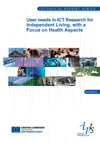 This report is the result of a workshop jointly organised by the Information Society Directorate General and the Institute for Prospective Technological Studies (IPTS) on the user needs in ICT Research for Independent Living, with a Focus on Health Aspects. The report proposes a holistic view for independent living and raises the challenges for realising the potentials of ICT based independent living services (ILS). It gives insight into the needs of the elderly people for support to independent living through ICT from a health and healthcare perspective. It concludes that users and their needs should be placed at the centre of ILS R&D and its implementation and it proposes policy options.
This report is the result of a workshop jointly organised by the Information Society Directorate General and the Institute for Prospective Technological Studies (IPTS) on the user needs in ICT Research for Independent Living, with a Focus on Health Aspects. The report proposes a holistic view for independent living and raises the challenges for realising the potentials of ICT based independent living services (ILS). It gives insight into the needs of the elderly people for support to independent living through ICT from a health and healthcare perspective. It concludes that users and their needs should be placed at the centre of ILS R&D and its implementation and it proposes policy options.
PREFACE
The Commission Communication "i2010-A European Information Society for growth and employment" proposes the launch of flagship ICT initiatives on key social challenges. One of these initiatives concerns caring for people in an ageing society, and the use of technologies for wellbeing, independent living and health.
As a consequence of the post-war baby boom and continuous improvement of health conditions, Europe is indeed about to face an important demographic challenge. Figures collected in various Member States and outlined in this report indicate the dimension of the situation. In summary, the dramatic increase in the number of elderly people as compared to active workers raises concerns about our European societies' capacity to sustain our social and healthcare systems.
The financial challenge is certainly one of Europe's major concerns. However, this should not hide the human dimension, or prevent us from questioning our societiesâ ability to integrate elderly people. First of all recent changes in our ways of living, due in particular to urban development conditions, have progressively isolated elderly people. Social isolation is often increased by health conditions such as chronic diseases, the incidence of which increases with age and leads to restricted mobility. It becomes difficult for elderly people to maintain their former levels of activity, leading sometimes to them living in extremely restricted situations such as hospitals or specialised institutions.
The workshop "User Needs in ICT Research for Independent Living, with a Focus on Health Aspects" aimed to better understand, on the one hand, how Information and Communication Technologies (ICT in short) can help in solving some age-related problems and, on the other hand, to identify actions which the Commission could initiate accordingly. The health and healthcare domain has been targeted because of its impact on the quality of life of the elderly and with a view to getting concrete, implementable results. Nevertheless, it should be clear that we cannot completely isolate healthcare from other social or economic fields and that we have to include, for instance, the interaction between healthcare and social care.
We are aware of the difficulty of the challenge. We are not claiming that ICT can replace the human factor, which is certainly more important than anything else in the support of elderly people. A chat with a neighbour or a nurse's visit are important interventions which have to be maintained and even encouraged. But ICT as a tool can provide complementary support, give new opportunities, like homecare and support to mobility, and remove the social or geographic distances between elderly people and their families. It can also reinforce older people's involvement in the community through the development of new activities, and through new ways of becoming part of human networks. By identifying the needs of elderly people, we hope that we will address more effectively the ways in which ICT can be integrated into their lives in order to provide the best possible support for their health and well being.
This workshop has given a good insight into the needs of the elderly for support to independent living through ICT from a health and healthcare perspective. The results of the workshop will be the basis for further work and initiatives. Such work and initiatives will support priorities defined in the Commission's policy document i2010, particularly those regarding the "flagship initiative on caring for people in an ageing society".
Gérard Comyn
European Commission, DG INFSO, ICT for Health Unit
Download link (.pdf): User Needs in ICT Research for Independent Living, with a Focus on Health Aspects
- Author(s): Gérard Comyn (HoU), Silas Olsson and Rainer Guenzler, DG INFSO/H/1, Rukiye Özcivelek, Dieter Zinnbauer and Marcelino Cabrera, IPTS
- EUR No: 22352 EN
- Year: 2006
- ISBN: 92-79-02983-5
- Catalogue (OPOCE): LF-NA-22352-EN-C